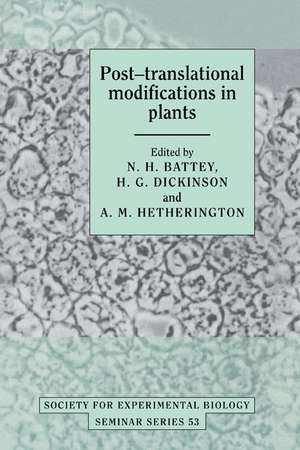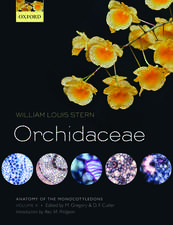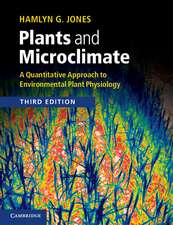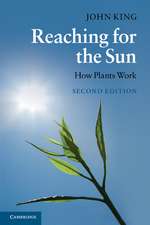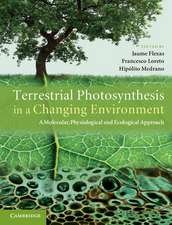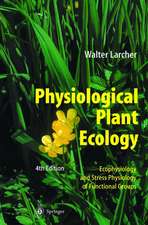Post-translational Modifications in Plants: Society for Experimental Biology Seminar Series, cartea 53
Editat de N. H. Battey, H. G. Dickinson, A. M. Hetheringtonen Limba Engleză Hardback – 17 mar 1993
Din seria Society for Experimental Biology Seminar Series
-
 Preț: 316.14 lei
Preț: 316.14 lei -
 Preț: 373.56 lei
Preț: 373.56 lei - 19%
 Preț: 505.08 lei
Preț: 505.08 lei -
 Preț: 426.99 lei
Preț: 426.99 lei -
 Preț: 320.50 lei
Preț: 320.50 lei -
 Preț: 368.93 lei
Preț: 368.93 lei -
 Preț: 426.41 lei
Preț: 426.41 lei -
 Preț: 374.88 lei
Preț: 374.88 lei -
 Preț: 316.73 lei
Preț: 316.73 lei -
 Preț: 376.40 lei
Preț: 376.40 lei -
 Preț: 417.07 lei
Preț: 417.07 lei -
 Preț: 343.94 lei
Preț: 343.94 lei - 14%
 Preț: 694.70 lei
Preț: 694.70 lei -
 Preț: 444.08 lei
Preț: 444.08 lei -
 Preț: 322.79 lei
Preț: 322.79 lei -
 Preț: 315.16 lei
Preț: 315.16 lei -
 Preț: 323.38 lei
Preț: 323.38 lei -
 Preț: 349.62 lei
Preț: 349.62 lei - 14%
 Preț: 765.48 lei
Preț: 765.48 lei -
 Preț: 353.26 lei
Preț: 353.26 lei -
 Preț: 343.14 lei
Preț: 343.14 lei -
 Preț: 426.99 lei
Preț: 426.99 lei -
 Preț: 374.88 lei
Preț: 374.88 lei -
 Preț: 406.46 lei
Preț: 406.46 lei -
 Preț: 320.88 lei
Preț: 320.88 lei - 11%
 Preț: 469.59 lei
Preț: 469.59 lei -
 Preț: 413.70 lei
Preț: 413.70 lei -
 Preț: 305.45 lei
Preț: 305.45 lei - 11%
 Preț: 470.11 lei
Preț: 470.11 lei -
 Preț: 336.87 lei
Preț: 336.87 lei -
 Preț: 318.51 lei
Preț: 318.51 lei - 11%
 Preț: 471.92 lei
Preț: 471.92 lei
Preț: 783.67 lei
Preț vechi: 911.24 lei
-14% Nou
Puncte Express: 1176
Preț estimativ în valută:
149.95€ • 156.58$ • 123.83£
149.95€ • 156.58$ • 123.83£
Carte tipărită la comandă
Livrare economică 15-29 aprilie
Preluare comenzi: 021 569.72.76
Specificații
ISBN-13: 9780521411813
ISBN-10: 0521411815
Pagini: 332
Ilustrații: 70 b/w illus. 9 tables
Dimensiuni: 155 x 234 x 20 mm
Greutate: 0.66 kg
Ediția:New.
Editura: Cambridge University Press
Colecția Cambridge University Press
Seria Society for Experimental Biology Seminar Series
Locul publicării:Cambridge, United Kingdom
ISBN-10: 0521411815
Pagini: 332
Ilustrații: 70 b/w illus. 9 tables
Dimensiuni: 155 x 234 x 20 mm
Greutate: 0.66 kg
Ediția:New.
Editura: Cambridge University Press
Colecția Cambridge University Press
Seria Society for Experimental Biology Seminar Series
Locul publicării:Cambridge, United Kingdom
Cuprins
1. Some roles of post-translational modifications in plants N. H. Battey; 2. Signal transduction and protein phosphorylation in bacteria R. A. Dixon; 3. Roles of protein phosphorylation in animal cells D. G. Hardie; 4. The significance of post-translational modification of proteins by phosphorylation in the regulation of plant development and metabolism K. M. Fallon and A. J. Trewavas; 5. Post-translational modification of chloroplast proteins and the regulation of protein turnover A. K. Mattoo; 6. Purification of a small phosphoprotein from chloroplasts and characterisation of its phosphoryl group J. Soll; 7. Use of synthetic peptides to study G-proteins and protein kinases within plant cells I. R. White; 8. Activation of membrane-associated protein kinase by lipids, its substrates, and its function in signal transduction G. F. E. Scherer; 9. Distribution and function of Ca2+-dependent, calmodulin-independent protein kinases N. H. Battey; 10. Phosphorylation of the plasma membrane proton pump M. R. Sussman; 11. The regulation of phosphoenolpyruvate carboxylase by reversible phosphorylation H. G. Nimmo; 12. Protein phosphorylation and circadian rhythms L. Rensing; 13. Control of translation by phosphorylation of mRNP proteins in Fucus and Xenopus A. D. Shirras; 14. Regulation of plant metabolism by reversible protein (serine/threonine) phosphorylation R. W. Mackintosh and C. Mackintosh; 15. Detection, biosynthesis and some functions of glycans N-linked to plant secreted proteins L. Faye: 16. Biosynthesis, intracellular transport and processing of ricin J. M. Lord and L. M. Roberts; 17. Post-translational processing of concanavalin D. Bowles; 18. The role of cell surface glycoproteins in differentiation and morphogenesis J. P. Knox.
Recenzii
'… a good starting point for undergraduates, not only in terms of plant biology but also as a discussion of post translational modifications in general.' David Stephens, FEBS Letters
Descriere
This book is about what happens to proteins once they have been synthesised within the plant cell.
